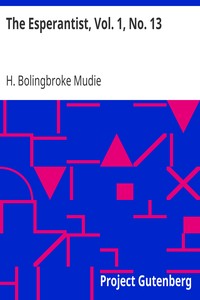The Esperantist, Vol. 1, No. 13 by H. Bolingbroke Mudie
"The Esperantist, Vol. 1, No. 13" by H. Bolingbroke Mudie is a periodical publication focused on the promotion and discussion of the international language Esperanto, written in the early 20th century. This volume contains various articles, essays, and translations that highlight the use of Esperanto as a means to foster communication and understanding across different cultures and nationalities. The contents reflect a growing interest in Esperanto and its applications in education, literature,
and international relations at that time. The opening of this issue presents the editor's notes discussing the formation and importance of the British Esperanto Association, emphasizing the need for effective organization and membership to promote the language. It touches on the enthusiasm of early adopters and contributors to raise funds and establish local societies. Alongside this, readers are introduced to various other articles and stories within the issue, including literary translations and discussions on Esperanto's growth both in Britain and globally. Overall, this portion sets the stage for an engaging exploration of the Esperanto movement and its advocates during a significant period of its history. (This is an automatically generated summary.)
Read or download for free
| How to read | Url | Size | |||
|---|---|---|---|---|---|
| Read now! | https://www.gutenberg.org/ebooks/37977.html.images | 122 kB | |||
| EPUB3 (E-readers incl. Send-to-Kindle) | https://www.gutenberg.org/ebooks/37977.epub3.images | 196 kB | |||
| EPUB (older E-readers) | https://www.gutenberg.org/ebooks/37977.epub.images | 195 kB | |||
| EPUB (no images, older E-readers) | https://www.gutenberg.org/ebooks/37977.epub.noimages | 105 kB | |||
| Kindle | https://www.gutenberg.org/ebooks/37977.kf8.images | 456 kB | |||
| older Kindles | https://www.gutenberg.org/ebooks/37977.kindle.images | 450 kB | |||
| Plain Text UTF-8 | https://www.gutenberg.org/ebooks/37977.txt.utf-8 | 100 kB | |||
| Download HTML (zip) | https://www.gutenberg.org/cache/epub/37977/pg37977-h.zip | 267 kB | |||
| There may be more files related to this item. | |||||
About this eBook
| Editor | Mudie, H. Bolingbroke (Harold Bolingbroke), 1880-1916 |
|---|---|
| Title | The Esperantist, Vol. 1, No. 13 |
| Note | Reading ease score: 56.0 (10th to 12th grade). Somewhat difficult to read. |
| Credits |
Produced by Andrew Sly, David Starner and the Online Distributed Proofreading Team at https://www.pgdp.net (This book was produced from scanned images of public domain material from the Google Print project.) |
| Language | English |
| Language | Esperanto |
| LoC Class | PM: Language and Literatures: Indigenous American and Artificial Languages |
| Subject | Esperanto -- Periodicals |
| Category | Text |
| EBook-No. | 37977 |
| Release Date | Nov 11, 2011 |
| Most Recently Updated | Jan 8, 2021 |
| Copyright Status | Public domain in the USA. |
| Downloads | 109 downloads in the last 30 days. |
| Project Gutenberg eBooks are always free! | |

